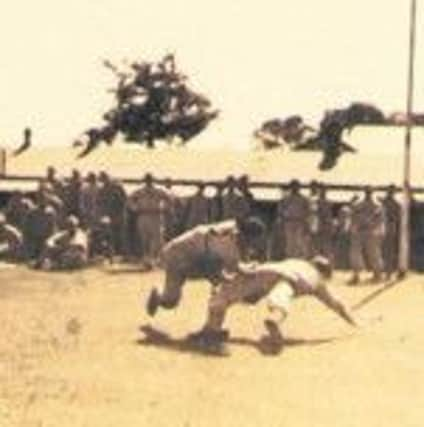Consul felt IRA navy bomb was doubtful for Londonderry


The cables also claim that current Deputy First Minister Martin McGuinness felt the British Government response to an extended Provo ceasefire over Christmas 1974/75 wasn’t good enough and that former Vanguard leader Bill Craig felt Sunningdale could herald civil war during which republicans would be killed and expelled from Northern Ireland.
The Kissinger Cables - as the anti-secrecy organisation is calling them in reference to the former US Secretary of State Henry Kissinger - are part of WikiLeaks’ “Public Library of US Diplomacy (PlusD)” and include several communiqué’s relating to the Northern Ireland table.
Advertisement
Hide AdAdvertisement
Hide AdAs well as the far-fetched theory that the Provisional IRA were planning to blow up the US base in the city, the newly-accessible cables also refer to senior Londonderry republicans’ positions in the leadership of the Provisionals and the newly-formed Irish Republican Socialist Party (IRSP).
They also refer to an address by SDLP deputy leader John Hume, the then Northern Ireland Minister of Commerce, to a group of Congressmen in Washington DC in 1974.
During the visit he is reported to have told the Congressmen that the Provos did not have the support of the people of the Bogside; that the SDLP represented the Catholic community in Northern Ireland; and that Noraid was a money-raising operation supportive of the IRA.
The cables refer to an endeavour to get Mr Hume to mail photocopies of US Justice Department records showing IRA leader Joe Cahil as a listed recipient of Noraid funds.
Advertisement
Hide AdAdvertisement
Hide AdThe reference to the alleged intention of the Provos of bombing the US Navy station - in operation in Londonderry from 1942 to 1977 - followed a conversation between the US Consul and a so-called reporter on June 25, 1973.
The cable says: “A journalist told ConGen today that Londonderry Provos are in process of deciding that USNav-Commsta will be made legitimate target of their operation.”
According to the communication the alleged source was a Londonderry Provo on the run in Letterkenny.
It says: “ConGen wondered why Provos would contemplate such action and particularly if reason might be importance of base payroll to economy of community.” The base commander was duly informed about the theory.
Advertisement
Hide AdAdvertisement
Hide AdThe cable continues that to “Belfast’s knowledge only person who has even half-way seriously mentioned attack on Londonderry base was Mrs Bernadette-McAlesky (sic).”
The documents claim she explained the idea in her book ‘Price of My Soul’ and that such a strategy could be used to “cause diplomatic incident by blowing up base installations to bring ‘Northern Ireland to the attention of the world.’”
The cable, however, goes on to note that Bernadette McAliskey was not, of course, a Provo.
It concludes: “Attacks on Londonderry base would seem highly unlikely. They should be about surest way one could think of to dry up financial support in US for Provos.”
Advertisement
Hide AdAdvertisement
Hide AdAnother document dated July 17, 1973, refers to the Irish Government’s anger and embarrassment after the Provos held a clandestine press conference near Dublin attended by leading Londonderry IRA men Sean Keenan and Jimmy Drumm.
The purpose of the conference, says the cable, was to launch a new booklet entitled ‘Freedom Struggle.’
After the conference the Garda Síochána raided a printer in Drogheda and apparently seized the “Provo book before it could be released to public.”
US diplomats were also keeping tabs on Sinn Féin Ardfheiseanna in the mid-70s.
Advertisement
Hide AdAdvertisement
Hide AdOne which took place on October 25, 1973, saw top Provo Dáithí Ó Conaill tell delegates the IRA would unleash violence south of the border if prisoners were extradited to the United Kingdom.
According to one cable the press reported the election of a number of Sinn Féin officers including prominent Londonderry republican Barney McFadden.
The cable states: ”Many are well known and there is no evident change at the top.”
Intriguingly, another cable dated December 10, 1973 - the day after the signing of the Sunningdale power-sharing agreement - referred to a meeting in the Ulster Hall on December 6, 1973, which was attended by the Apprentice Boys amongst others, and whose purpose was to organise opposition to the settlement.
Advertisement
Hide AdAdvertisement
Hide AdThe cable suggests “extra-parliamentary tactics are likely to include civil disobedience and rioting and Craig (Vanguard leader Bill Craig) privately predicts civil war in which republicans might be killed or driven out of the north.”
A further cable refers to the post-Sunningdale Minister of Commerce John Hume’s trip to Washington.
The SDLP’s position - as outlined by Mr Hume - was deemed “convincing and further visits to Washington by Catholic leaders like Hume could very well result in recognition of SDLP as legitimate spokesman for Catholic minority in Northern Ireland.”
Mr Hume also slammed Noraid - a fund-raising vehicle supportive of the IRA.
Advertisement
Hide AdAdvertisement
Hide AdThe cable states: “British Embassy will follow up by having Hume mail photocopies of US Justice Department records showing Joe Cahill as listed recipient of INAC funds.”
A final diplomatic cable dated January 16, 1975, is headed ‘Newspaper discusses IRA Army council.”
It was written by the then London Times reporter Robert Fisk and refers to the breakdown of an IRA truce over Christmas 1974/75.
The cable stated that the article referred to “meetings of IRA ‘Army Council’ in Republic.”
Advertisement
Hide AdAdvertisement
Hide AdHowever, it goes on to say that Fisk stated that not all participants were actual members of the IRA Army council.
It says that Seamus Twomey - an IRA leader from Belfast - voted for an extension of the truce, whereas Brendan Hughes “felt that British response to truce had been inadequate.”
The cable states: “Martin McGuinness of Derry. (Same position as Hughes.)”